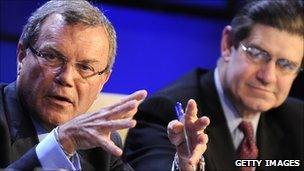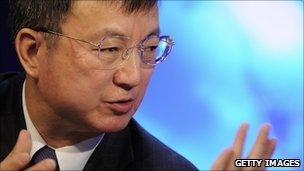Davos 2011: Global economy in recovery mode
- Published

For Sir Martin Sorrell (left), the "gorilla in the room" was the US deficit
The global economy is set for a broad recovery during 2011, according to economists and business leaders at the World Economic Forum in Davos.
However they predict a three-speed recovery where only emerging markets like China, India and Brazil grow fast.
The US and Germany are expected to grow strongly, while most advanced economies will make only little progress.
But they also warned that inflation, protectionism and public and private debt could still derail economies.
Glass half-full and half-empty
The session on the state of the economy, a traditional fixture kicking off the annual meeting of the world's top business and political leaders, was the most optimistic since the start of the global financial crisis in 2007.
Even Nouriel Roubini, one of the few economists to have predicted the credit crunch and a notorious pessimist, spoke of a situation where "we have a glass that is half-empty and half-full".
On the upside, he listed the recovery and "first signs of acceleration" in the economies of both advanced and emerging markets, a reduced risk of inflation and a sharp improvement of corporate balance sheets.
But he and other speakers also warned of "potential negatives". The economic slowdown in the UK and the problems in the periphery of the eurozone had shown that the crisis was not over yet, while most advanced economies would see at best "anaemic growth".
Harvard University's Ken Rogoff tells the BBC that defaults in the eurozone are a real possibility
G Zero
The painful process of paying off debt - both in the private and public sector - was still ongoing.
Especially in the United States, the government deficit was "the big gorilla in the room," said Sir Martin Sorrell, chief executive of advertising giant WPP. It was unlikely that this would be tackled until after the presidential and congressional elections in 2012.
However the biggest threat, all speakers agreed, was the lack of co-operation between governments - both on regulation and trade.
With inequality rising, a populist backlash could goad governments into raising trade barriers, but that would be disastrous for all economies.
The G20 countries had not demonstrated that they could work together on key issues like taxes and regulation, or long-term problems like trade. Instead, the world had no leadership, a "G Zero", he said.
Power shift

The IMF's Zhu Min said the successful transformation of the Chinese economy was crucial
Mr Roubini warned that emerging markets were not in the clear. They were the world's new engines of economic growth, but were threatened by rising inflation, overheating, and asset bubbles - especially in the property market.
There was a chance that India and China could achieve a soft landing, but it was not guaranteed.
Zhu Min, special adviser of the International Monetary Fund and a former deputy governor of the People's Bank of China, said one of the biggest risks for global markets was the transition of these economies from their current export-dependent model of economic growth into one that relied more on domestic demand.
"This transformation is the key test," Mr Zhu said.
These economic distortions, ventured Azim Premji, chairman of Indian outsourcing giant Wipro were signs of "the slowdown of the Western world, the rise of the emerging world, and the shift of power, the shift of demand".
Sir Martin proposed to remove the words "emerging" and "developing" from the lexicon, they did not fit economies with the size and dynamism shown by China, India, Vietnam, Brazil and many others.
Getting it right
After the session, one economist quipped that the optimism of the panel was a sure sign of an imminent economic crash - and indeed in both 2007 and 2008 most of the panel members of the day got their forecasts badly wrong.
Their track record from last year is a bit better. Back then they predicted a LUV economy: L-shaped i.e. a crash followed by no or low growth in Western Europe; U-shaped, with a slow but steeper recovery in the United States; and V-shaped, showing rapid growth, for emerging markets.
That was broadly right, although most companies underestimated one thing: the rapid recovery of company earnings.
Clearly, companies had not let the crisis go to waste and emerged leaner and more efficient.
The dream is a dream
Long-term, though, the panelists agreed, all economies faced a much bigger problem: demographics - resulting in either very young populations or ageing societies.
Mr Zhu said all people in developing countries wanted the same thing: "an American life, with a big house, a car and a pension."
No economy could truly afford that, Mr Zhu said. "We have to find a new model" and send this "clear message to the whole world".